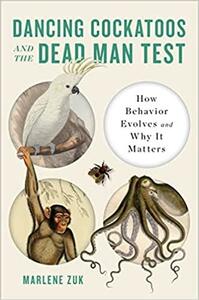Take a photo of a barcode or cover
15 reviews for:
Dancing Cockatoos and the Dead Man Test: How Behavior Evolves and Why It Matters
Marlene Zuk
15 reviews for:
Dancing Cockatoos and the Dead Man Test: How Behavior Evolves and Why It Matters
Marlene Zuk
funny
informative
medium-paced
funny
informative
medium-paced
There's some good stuff in here. My views on animal behavior/intelligence have shifted a lot thanks to more recent books by researchers in the field, and this is a good addition to that canon.
Is behavior innate or learned? Nature vs nurture; genetics vs. environment? Which is the winner? According to this book, neither. It is, as she writes, "the interplay between genes and environment that' important...all attributes, behavior or not, have contributions from both genes and the environment, in a complex way that defies a simple apportionment into percentages of each." She then takes us through a journey through the natural world, from anxiety in crayfish to the evolution of language. She addresses issues from how to define what we mean by the word behavior, how do behaviors evolve, how correlation does not imply causation, and how Human narcissism makes it difficult for even trained scientists to correctly interpret the behavior of non-Humans. The author manages all of this without getting bogged down in technical jargon, writing in an informal style friendly to the lay person. Highly recommended.
informative
reflective
medium-paced
"Animals are not cars, and a more recently evolved species is not an improvement on one that has not changed in millions of years. By that token, microbes and viruses, which evolve rapidly, should be the pinnacle of evolution, because they have changed into new forms literally in our lifetimes. But evolution does not have a goal or try to improve anything. Yes, those individuals with characteristics better suited to the environment leave more copies of their genes to future generations, but everything that is alive now is just as evolved as everything else. Some animals, such as cockroaches and crocodiles, look more like their ancestors than others, but evolution has been acting on them just the same. And just as your brain does not have a tiny lizard inside, the brains of birds do not represent more primitive versions of mammal brains that were improved upon when mammals, or humans, came on the scene."
Aside from wonderful anecdotes, there is little here that is new in Zuk's repetoire. Once again, she writes amusingly and provokingly about how we need to abandon a simplistic view of nature vs nuture, with the focus here on the evolution of animal behaviours and how environment, genes and social interaction all influence the results. I honestly didn't really care about the absence of new materials, or even that, as usual, I could take issue with her on a few points because this is just so wonderfully, wittily grumpy I could hang out with her words all day.
Aside from wonderful anecdotes, there is little here that is new in Zuk's repetoire. Once again, she writes amusingly and provokingly about how we need to abandon a simplistic view of nature vs nuture, with the focus here on the evolution of animal behaviours and how environment, genes and social interaction all influence the results. I honestly didn't really care about the absence of new materials, or even that, as usual, I could take issue with her on a few points because this is just so wonderfully, wittily grumpy I could hang out with her words all day.
informative
lighthearted
reflective
medium-paced
informative
inspiring
reflective
medium-paced
What a delightful book. Informative with a wonderful cast of critters to learn about.
This book offers a fascinating look at animal behavior and how it evolves. It's detailed with numerous anecdotes and a touch of humor. Though it doesn't have a narrative style, it's easy enough to read. I loved how it demonstrated the pointlessness of the nature vs. nurture debate—how the two work together and can't be isolated from each other.
Thanks, NetGalley, for the ARC I received. This is my honest and voluntary review.
Thanks, NetGalley, for the ARC I received. This is my honest and voluntary review.
**3.75 stars really**
In Dancing Cockatoos and the Dead Man Test, biologist Marlene Zuk sets herself the goal of explaining the evolutionary history animal behaviors (especially ntelligence). She starts off by seeing parameters people don't normally think of... specifically that you shouldn't judge a fish by how well it climbs trees. In other words, that you shouldn't judge an animal compared to humans, but instead determine how they evolved to fill their niche and how those adaptations affect the behavior of the organisms. She then DID compare the animals to humans explaining how insights into humans (at least fascile ones) can be gained by understanding what makes animals tick.
Being an evolutionary biologist, Zuk did a great job explaining how the adaptations she discussed arose. She does this through the use of anecdotes to introduce the behavior and explain how it is studied in that organisms. Since he research is primarily in insects, she devoted a good amount of time to this branch of the tree of life (which is sometimes ignored in favor of cuddller beasts). Some of these anecdotes were humorous, all were fascinating and some outright suggested future research topics.
At times, the book felt a bit repetitive in tone (though not in topic). This lead to me taking it in smaller chunck's than i normally would making it seem like a slow read. It never failed to be interesting though.
My favorite portion was in the section "Raised By Wol es" when Zuk discussed a Russian experiment with domestication of foxes. I first read about this experiment decades ago and thought I ideation it. Dr. Zuk, however, brought it into new light and I felt like I not only understood the experiment better, but domestication selection as well.
I would recommend this book to anyone wanting a deeper understanding of evolution in general and the evolution of behavior in particular. After reading it, I know that I want to take a class in evolutionary biology from this professor.
Thank you to the publisher and Netgalley for giving me the opportunity to read an advance copy of this book.
#DancingCockatoosandtheDeadManTest
In Dancing Cockatoos and the Dead Man Test, biologist Marlene Zuk sets herself the goal of explaining the evolutionary history animal behaviors (especially ntelligence). She starts off by seeing parameters people don't normally think of... specifically that you shouldn't judge a fish by how well it climbs trees. In other words, that you shouldn't judge an animal compared to humans, but instead determine how they evolved to fill their niche and how those adaptations affect the behavior of the organisms. She then DID compare the animals to humans explaining how insights into humans (at least fascile ones) can be gained by understanding what makes animals tick.
Being an evolutionary biologist, Zuk did a great job explaining how the adaptations she discussed arose. She does this through the use of anecdotes to introduce the behavior and explain how it is studied in that organisms. Since he research is primarily in insects, she devoted a good amount of time to this branch of the tree of life (which is sometimes ignored in favor of cuddller beasts). Some of these anecdotes were humorous, all were fascinating and some outright suggested future research topics.
At times, the book felt a bit repetitive in tone (though not in topic). This lead to me taking it in smaller chunck's than i normally would making it seem like a slow read. It never failed to be interesting though.
My favorite portion was in the section "Raised By Wol es" when Zuk discussed a Russian experiment with domestication of foxes. I first read about this experiment decades ago and thought I ideation it. Dr. Zuk, however, brought it into new light and I felt like I not only understood the experiment better, but domestication selection as well.
I would recommend this book to anyone wanting a deeper understanding of evolution in general and the evolution of behavior in particular. After reading it, I know that I want to take a class in evolutionary biology from this professor.
Thank you to the publisher and Netgalley for giving me the opportunity to read an advance copy of this book.
#DancingCockatoosandtheDeadManTest
informative
slow-paced


